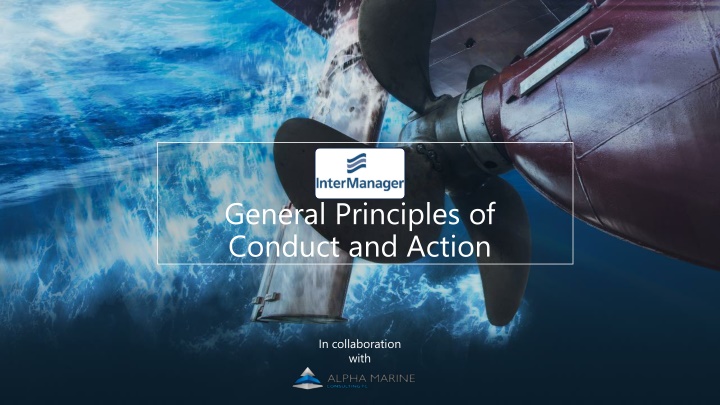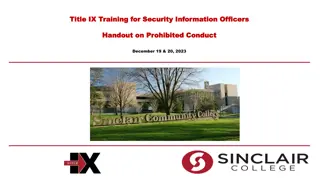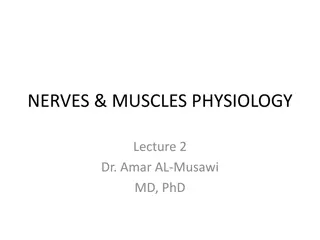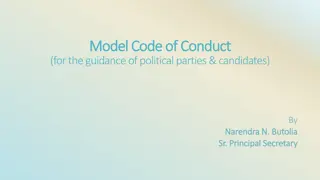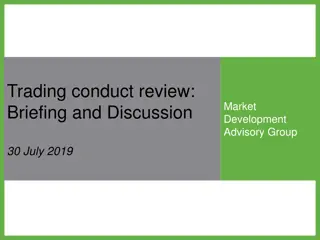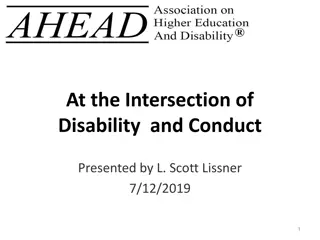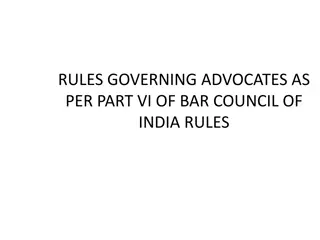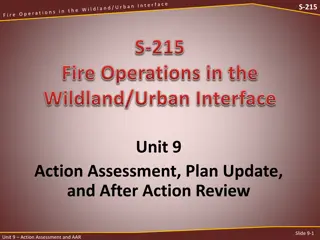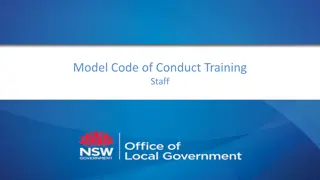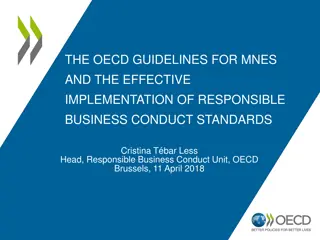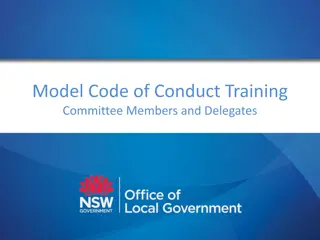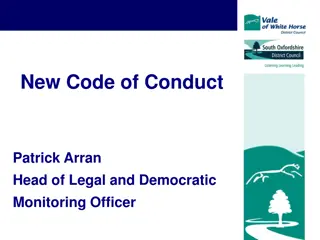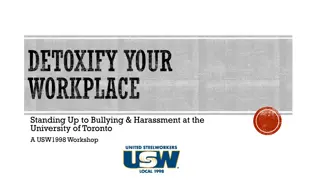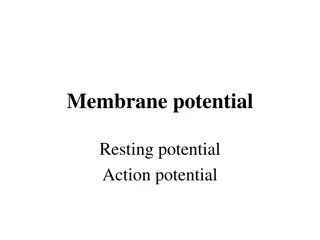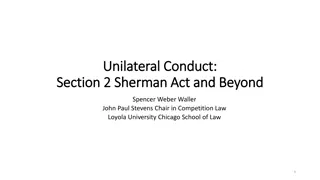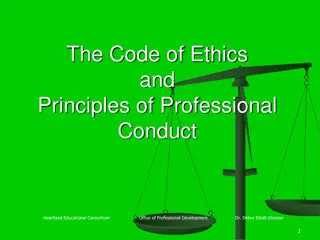InterManager's General Principles of Conduct and Action
InterManager, a prominent trade association in the shipping industry, has established General Principles of Conduct and Action to uphold ethical standards, promote safety, environmental protection, and continuous improvement. These principles guide members towards integrity, professionalism, and accountability, fostering a culture of care and respect. By emphasizing adaptability, knowledge sharing, and sustainable practices, InterManager aims to shape a progressive and responsible future for the industry.
Download Presentation

Please find below an Image/Link to download the presentation.
The content on the website is provided AS IS for your information and personal use only. It may not be sold, licensed, or shared on other websites without obtaining consent from the author.If you encounter any issues during the download, it is possible that the publisher has removed the file from their server.
You are allowed to download the files provided on this website for personal or commercial use, subject to the condition that they are used lawfully. All files are the property of their respective owners.
The content on the website is provided AS IS for your information and personal use only. It may not be sold, licensed, or shared on other websites without obtaining consent from the author.
E N D
Presentation Transcript
General Principles of Conduct and Action In collaboration with
03 06 07 23 Introduction General Principles of Conduct and Action Care and Respect for People Continuous Development and Optimization CONTENTS 39 54 58 Effective Safety Culture Assessment and Verification Annual Self Assessment And Improvement Cycle 60 69 70 Periodic Third Party Assessment and Verification Continuous Performance Improvement Monitoring Conclusion
INTRODUCTION InterManager is regarded as one of Shipping s most influential trade associations that has successfully helped shape the industry over the years. Our primary aim is to continuously improve Ship Management Industry s standards and we are dedicated to assist all members differentiate from the rest of the industry, set the standard and assure their optimum quality of operation and service. Loyal to this mission, InterManager gave written expression to its General Principles of Conduct and Action in order to reinforce their communication and implementation worldwide. throughout the Association These principles guided successfully our activities over the past 30 years and can now provide the framework for establishing a common modus operandi among members in order to facilitate a culture of integrity, care, professional commitment, respect for others, efficiency and accountability. InterManager s General Principles of Conduct and Action also act as a guide dedicated to raising awareness on areas involving ethical risk and discouraging unethical conduct. 03 We anticipate that, through their live and dynamic nature, our principles will systematically be guiding our members in an everchanging world and ensuring that they achieve a minimum of prerequisites.
HOW IT WORKS The Shipping industry undergoes and will undergo dramatic changes in the future and InterManager considers that success comes through adaptability. Thus, members are expected to be progressive and constantly mobilized towards change and innovation. Unity is strength, and members are furthermore presumed to be part of a culture where willingness to improve and sharing of knowledge and best practices with each other lays within its core. Committed to protecting and preparing future generations, they should act proactively and collectively towards shaping a sustainable future for the industry and the community. To accommodate these expectations, the new General Principles of Conduct and Action take on board the essential parts of InterManager s existing DNA. Its aim is to: i. Ensure commitment to safety, environmental protection and sustainable operations by everyone (members, associates and third-parties) related to the Association. Continuously improve professional and ethical standards internally for members and externally for partners. Mobilize members so they are not simply passengers but active ambassadors of progress on all levels. ii. iii.
HOW IT WORKS InterManager s General Principles of Conduct and Action are not intended to be exhaustive and static, but rather aim to address the essential areas of focus and be adaptable. They may be further complemented in the future by more specific requirements and prerequisites having regard to current conditions, particular industry demands and social changes, but in any case, without detracting from the core of the general principles. The purpose of this document is to make a public statement of the Association s adherence to the General Principles of Conduct and Action, which applies to all InterManager Members and constitutes a requirement for belonging to InterManager.
GENERAL PRINCIPLES OF CONDUCT AND ACTION 06
CARE AND RESPECT FOR PEOPLE I. Diversity, Inclusion and Equal Opportunities II. Bullying and Harassment III. Stakeholders Health and Wellbeing IV. Social Responsibility V. Partnership 07
CARE AND RESPECT FOR PEOPLE Diversity, Inclusion and Equal Opportunities Unity in diversity towards excellence All InterManager members are committed to Diversity, Inclusion and Equal Opportunities and ensure fair treatment and equal opportunities for all. We acknowledge that unity in Diversity outperforms unity in similarities and thus recognise, respect each other's differences and embrace a diverse environment with a wide range of backgrounds and mindsets. Equal opportunities mean fairness at its core: we ensure that individuals, or groups, are not treated less favourably because of their protected characteristics. We aim to eradicate prejudice and discrimination in Shipping on the basis of individual or group s characteristics such as: Race Gender Age Religion/belief Sexual orientation Pregnancy Disability We protect the disadvantaged and provide the tools they need to access the same, fair opportunities as the rest of their peers. By promoting inclusion, we create an environment where welcomed and valued. protected everyone feels We are vigilant and DO NOT tolerate any form of discrimination on our watch. Through continuous training we raise our awareness of our unconscious biases and learn how to manage them.
CARE AND RESPECT FOR PEOPLE Diversity, Inclusion and Equal Opportunities Code of Conduct including Diversity, Inclusion and Equal Opportunities valuing Shore and Seagoing personnel by respecting their human rights, complying with the MLC and all applicable legislation. Expected Behaviours/KPIs 01 02 Management system, supported by appropriate staffing and procedures, to promote Diversity, Opportunities and manage compliance with MLC. Inclusion and Equal Code of Conduct including Diversity, Inclusion and Equal Opportunities, relevant guidelines (Dos and Don ts) and practical resources are provided as part of the onboarding process to newcomers. 03 Mandatory cultural awareness, diversity and inclusion, emotional intelligence, social dynamics training and mentoring plan is available for Shore and Seagoing personnel aiming to facilitate cultural competencies. 04 An environment where personnel is informed, involved and able to exercise their rights through regular communication of their rights and obligations in relation to Diversity, Inclusion and Equal Opportunities is cultivated. 05 06 Declaration employment contracts which must be signed as read and acknowledged by the newcomer. of employees/seafarers rights included to Anti-discrimination discrimination verified by internal audits, surveys, visits, whistleblowing, disciplinary actions and ensured confidentiality. enforcement: Zero tolerance to 07
CARE AND RESPECT FOR PEOPLE Diversity, Inclusion and Equal Opportunities Expected Behaviours/KPIs Recruitment, promotion and career development are based on merit (qualifications, skills, talent, motivation, potential, fit for duty, etc.) regardless of any protected characteristic or relationship. 08 Shore and Seagoing personnel s career and promotion support is provided through identification of individual training for the development of the necessary technical and behavioural competencies. 09 Procedures, plans and practices that promote visible leadership, teamwork, respect and fair treatment and aim to continuously improve trust from Top Management to all levels/ranks of personnel. 10 Recruitment and promotion of female seafarers is actively encouraged through policies and recruitment plans. Guidelines to ensure gender equality and protection are in place. Female seafarers empowerment is achieved through special forums, communications, mentoring, training and relevant industry information sharing regarding. 11 Grievance and whistleblowing procedure (as per ISO 37002) as well as Open Reporting System facilitate communication of discrimination occurrences, incidents, complains and relevant improvement suggestions. Confidentiality and non retaliation is ensured. 12 Forced labour is strictly prohibited: It is verified that Shore and Seagoing personnel (as applicable) are not subject to fraud, debt bondage, illegal recruitment fees, other placement fees, contract substitution, passport retention, repatriation costs, etc. It is ensured that all personnel receive their salaries in full, on time and at the official published rate, including any overtime and/or agreed bonuses. 13 Equal pay for equal work value is guaranteed (same position/rank/responsibilities, same pay) through crewing, human resources and accounting record verification. 14
CARE AND RESPECT FOR PEOPLE Bullying and Harassment Our tolerance is ZERO All InterManager members are committed to providing a working environment free from bullying and harassment of any kind. We have zero tolerance regarding any unwanted conduct that has the purpose or effect of violating a person's dignity or creating an intimidating, hostile, degrading, humiliating or offensive environment for them. We welcome and facilitate only legitimate and reasonable criticism of a staff member s performance or behaviour, or reasonable management instructions within the boundaries of our principles and ethics. We aim to ensure that all staff are treated, and treat others, with dignity and respect onboard, at work and out of the workplace, work-related events or social functions. We reinforce positive behaviours through encouraging speaking up and grievance, access to support, retaliation, training, raising awareness and through leading by example. Offensive, intimidating, malicious or insulting physical or verbal behaviour, abuse or misuse of power through means that undermine, humiliate, denigrate or injure the recipient are not tolerated. promoting non- This applies to all staff at all levels and ranks and independent contractors which bear personal responsibility not to bully or harass any other staff or contractor. We are vigilant and DO NOT tolerate any form of harassment and bullying on our watch.
CARE AND RESPECT FOR PEOPLE Bullying and Harassment Expected Behaviours/KPIs Code of Conduct sets the expectations to refrain from any kind of bullying, harassment, violence and non retaliation onboard, at work and out of the workplace, work-related events or social functions complying with all applicable legislation. 01 Management system, supported by appropriate staffing and procedures, with zero tolerance and immediate resolution for bullying, harassment, violence and non retaliation occurrences including disciplinary actions of various degrees applicable to to all staff at all levels and ranks and independent contractors. 02 Code of Conduct including bullying, harassment, violence and non retaliation relevant guidelines (Dos and Don ts) and practical resources are provided as part of the onboarding process to newcomers. 03 Mandatory anti-bullying and harassment training available for Shore and Seagoing personnel aiming to raise awareness and promote vigilance. 04 An environment where personnel is informed, involved and able to exercise their rights through regular communication of their rights and obligations in relation to bullying, harassment, violence and non retaliation is cultivated. 05 Grievance procedures and whistleblowing procedure (as per ISO 37002) as well as Open Reporting System facilitate communication of bullying, harassment, violence occurrences, incidents, complains and relevant improvement suggestions. Confidentiality and non retaliation is ensured. 06 Anti-bullying and harassment enforcement: Zero tolerance to bullying, harassment, violence and retaliation verified by internal audits, surveys, visits, disciplinary actions and ensured confidentiality. 07
CARE AND RESPECT FOR PEOPLE Bullying and Harassment Company specific minorities and vulnerable groups who have one or more protected characteristics are defined in Management system. Provisions for special attention to risky situations and having open communication (e.g. surveys and interviews) are provided. Expected Behaviours/KPIs 08 Strict guidelines and regulations to ensure maximum protection against bullying and harassment especially towards women on board. 09 Access to 24/7 helpline providing support and guidance to bullying, harassment, violence and retaliation victims. 10 Recognise the Risk & Take Action Plan. Develop a clear understanding of what bullying, harassment, violence and non retaliation is, the relevant consequences, find out what preventive measures must be taken and establish a prevention program. 11 12
CARE AND RESPECT FOR PEOPLE Stakeholders Health and Wellbeing We protect and care for our people All InterManager members are mindful employers recognise that our a Company is its people and are dedicated to increasing physical and mental health and wellbeing awareness and provide the necessary resources, support and information. We are dedicated to promote understanding of the positive link between physical and mental health and organizational resilience. Our leadership is dedicated to reduce stigma and make it healthier to talk about any physical and mental health issues in the workplace. wellbeing and Understanding the factors that influence our stakeholders health and wellbeing is of paramount importance in our philosophy. We protect our people during and after emergencies and crises and mitigate the impact in their physical and mental health and wellbeing . We commit to value and respect our staff, safeguard their physical and mental Health and Wellbeing and protect their human rights in accordance with Maritime Labour Convention. We consolidate a healthy workplace through setting realistic and measurable targets, involving all in the process, to continuously improve it. Caring for ourselves and each other is our duty. Setting a proactive culture focused on the prevention and promotion of physical and mental health and wellbeing is a priority.
CARE AND RESPECT FOR PEOPLE Stakeholders Health and Wellbeing Code of Conduct including commitment to promoting Physical and Mental Health and Wellbeing of all staff complying with the MLC and all applicable legislation. Expected Behaviours/KPIs 01 Management system, supported by appropriate staffing and procedures, includes a Fatigue Risk Management System to ensure fatigue is considered in crewing arrangement. 02 Physical and Mental Wellbeing Plan with goals and objectives supported by a committee of designated and appropriately trained wellbeing personnel and a relevant budget as an integral part of measures to address occupational health, morale, motivation, security and safety for all staff. 03 04 Wellbeing Plan addressing five criteria: physical, emotional, intellectual, spiritual, and social aspects. Assesses tasks, duties and responsibilities to meet peak workload situations, conditions and requirements, and ensure the welfare and health of seafarers by avoiding extreme fatigue. 05 Fresh, healthy, good quality food and water, of sufficient quantity, nutritional value, and variety, considering religious and medical requirements and cultural practices is provided. 06 Focuses on mental health, by providing mental health support (e.g. 24/7 helpline access, mental health champions) and access to free and confidential counselling for all staff. 07
CARE AND RESPECT FOR PEOPLE Stakeholders Health and Wellbeing Expected Behaviours/KPIs Staff health and wellbeing aspects are monitored periodically (e.g. through surveys, interviews, or consultations) including listening to and actioning suggestions from staff for improvement of the relevant areas. 08 Training for all staff on physical wellbeing, reducing stigma, stress management, psychological first aid and mental health is available to increase knowledge and awareness. 09 Guidelines to empower and encourage staff to speak up when operational demands from superiors risk their own safety and wellbeing. 10 Grievance procedures and whistleblowing procedure (as per ISO 37002) as well as Open Reporting System facilitate communication of health and wellbeing complains and relevant improvement suggestions. Confidentiality and non retaliation is ensured. 11 High-quality recreation facilities in each vessel on its fleet are available. Recreational and wellbeing activities are planned for the crew to encourage social interaction. Access to low cost/high quality internet is available. Bonding and wellbeing activities for shore staff are promoted. 12 13 Preventive health care program that promotes and encourages staffs health and wellbeing. Emergency, crisis and/or threat management plan is in place to mitigate harm and protect Physical and Mental Health and Wellbeing of staff and their families. 14
CARE AND RESPECT FOR PEOPLE Social Responsibility The power of giving back All InterManager members are accountable to operate, develop and grow in a manner that benefits the society and environment and prepare and generations. We ethically validate our decisions to ensure that no harm to society or the environment ensues from our actions. Through dialogue with all, we establish stable relationships, mechanisms, identify the most relevant subjects to improve our sustainability and constantly evolve. active listening protect future Our leadership considers personal gain over the society and environment s welfare as unethical and irresponsible. We understand the impact: we acknowledge that the positive Responsibility is hard to quantify, but the negative consequences of a disaster are enormous. We ensure that the Social Responsibility strategies and practices are followed, reached, evaluated improve. effect of Social We behaviour that generates value to all interest stakeholders (customers, staff, suppliers, environment and community) in the context of a socially responsible culture. aim at creating and promoting and constantly Our goal: Sustainable growth Our duty: Welfare of the society and the environment Transparent and ethical behaviour govern the entire spectrum of our operations at all times. We unite to assist the society in crises.
CARE AND RESPECT FOR PEOPLE Social Responsibility Code of Conduct including commitment to creating and promoting behaviours that generate value to all interest groups (customers, employees, suppliers, shareholders) in the context of a socially responsible culture that is reflected in the development of a sustainable Company. Expected Behaviours/KPIs 01 environment and 02 Website that serves as telematic support to consult the Company s Social Responsibility and any revisions or updates. Ethics Committee that guarantees the principles and norms of conduct including at least the Top Management, HR/Crew and HSQE. Heads ensure that the Company s Social Responsibility strategies and practices are followed, reached and evaluated. 03 04 Social Responsibility action plan with KPIs, actions and relevant timetable. Benchmarking as a guide is utilized to compare the Company s Social Responsibility performance against top performers within InterManager/Industry and develop an optimal roadmap of initiatives. 05 06 Ensuring a transparent and sustainable business by supplying knowledge of all necessary operational aspects. Personnel volunteerism, diversity & inclusion, motivation, turnover rate, data protection & privacy, etc) is measured. Improvement actions and relevant timetables are available. Engagement (satisfaction, health, respect, 07
CARE AND RESPECT FOR PEOPLE Social Responsibility Total Company Social Responsibility Impact KPI (number of social activities, number of community members organization reached, time spent in volunteering, no of social policies, etc). Improvement actions and relevant timetables are available. Expected Behaviours/KPIs 08 09 Social Return of Investment (SROI) calculation. Company Social Responsibility Recognition: The Company actively seeks and obtains recognition through pursuing relevant nominations and awards. 10 Strategic Partners KPI (significant collaborations with corporate partners, non-profit organizations and NGOs) aiming to improve Shipping and the Community in general. 11 14
CARE AND RESPECT FOR PEOPLE Partnership It is our network that makes us unique All InterManager members acknowledge that Partnership is fundamental in the way we work towards achieving our mission. We share ownership and responsibility regarding all members ethical obligations and celebrate each others successes as one. We interactive intergovernmental organisations (IGOs), non-government organisations (NGOs) and a wide range of partners including industry associations, business, consultants & academia. form mutually relationships beneficial and with Partnership enables us to utilise our considerable experience, knowledge and motives. It allows us to deliver sustainable services, optimize our operations and to thereby strengthen the overall system. Partnership allows us to combine our resources and expertise with each other and our partners, so that we can work more effectively, and achieve more, than we would if working individually. This enables us to include a wide range of perspectives in both our policy and operations which is why our views are widely respected within the industry and far beyond. We move from rivalry to cooperation to advance our mutual interests and we know that a lasting Partnership begins with trust, open communication accessibility. We sustainability organisations to develop their skills and capacities through shared projects. facilitate capacity by building and supporting partner and We share aspirations towards common goals of sustainable and positive impact.
CARE AND RESPECT FOR PEOPLE Partnership Expected Behaviours/KPIs Partnership Policy which outlines the principles and approaches that are fundamental to Company s project level, one-to-one, alliances, coalitions, consortia and strategic level partnerships. 01 Company s goals should align with InterManager s and provide a clearly defined added value to achieving its mission. Company s vision, mission, values and ways of working should be compatible with InterManager s. 02 Commitment in providing agreed inputs in common projects and necessary support for the delivery of intended outcomes, towards achieving agreed goals with the rest of the members. 03 Commitment to foster an open and participatory dialogue between members/partners with an emphasis on consultation and sharing of information from the earliest stages of the relationship. 04 Commitment to learning from each others actions, successes and mistakes and to provide the necessary time, space and environment to facilitate formal and informal learning to ensure that all members/partners can act upon lessons learnt successfully. 05 Participation in joint learning activities to facilitate learning processes between partners in order to strengthen learning practices and to support a structured approach to learning that provides opportunities for reflection and joint improvement. 06 Safeguard all InterManager members right to be at the table and exhibit mutual respect for all other members , irrespective of their size, power or status. Engaged to ensure that the association is not be dominated by any one organisation and all members should expect to be treated fairly. 07
CARE AND RESPECT FOR PEOPLE Partnership Respect each others mandates, obligations, principles and independence. Recognise other members for all of their contributions, not simply those that are measurable in terms of cash value or public profile. Expected Behaviours/KPIs 08 Ethical obligation to the other members/partners to accomplish tasks with integrity and in a responsible and appropriate manner. 09 Commitment to work with other members/partners and not through them: Collaborate to achieve shared goals, contribute beyond the immediate scope towards building networks, value and respect members/partners approaches, opinions and creativity and support capacity development and working towards excellence. 10 Accountable for choosing the right partnerships to work with and understand every partner organisation s strengths and weaknesses. 11 Due Diligence basic minimum standards outline for assessing potential partners. 12 Due Diligence exercise with potential partners, to assess its structure and governance, key capacities, reputation and ethics. Provide assistance for improvement if acceptable weaknesses are identified. 13 Memoranda of Understanding (MoU) for important mutually beneficial long term partnerships. The MoU to agree an overall goal, ethics and vision for the partnership and how it might develop over a defined period of time. A strategy for working together and examples of the type of collaboration or projects that might be embarked upon is outlined. 14
CONTINUOUS DEVELOPMENT AND OPTIMIZATION I. HSQE Excellence II. Ethical Business and Sustainability III. Innovation and Change IV. Effective Human Resources V. Training Ashore and Onboard 23
CONTINUOUS DEVELOPMENT AND OPTIMIZATION HSQE Excellence Do it right consistently, do it better continuously All InterManager members continuously pursue operational excellence through strong commitment to maritime HSQE aspects. Our primary goal is to avoid causing any harm to people or the environment. We continuously strive to improve the quality and safety of our services. We mitigate risks by engaging in activities that focus on the core competencies of crisis management, preparedness, response and recovery. prevention, Health, safety, quality and environmental protection are core principles of our business. They are the foundation to everything we do. Our decision making, actions and behaviours will adhere to these principles 100% of the time. We environmental operations and minimize or even eliminate hazardous emissions. actively seek impact to minimize of our the own Through management systems we embed HSQE into our daily operations. our optimized integrated We don t just comply, we take HSQE concerns to heart. We have our own strict quality standards which comply with requirements determined by regulatory authorities, InterManager General Principles of Conduct & Action and our clients standards. We recognize the importance of an effective security program to protect our personnel, assets, information, integrity and reputation from threats. all applicable
CONTINUOUS DEVELOPMENT AND OPTIMIZATION HSQE Excellence An Integrated Management System (IMS) is in place covering all HSQE relevant aspects/policies and industry s requirements. IMS is optimized/simplified to maximize implementation, consistency and compliance. Expected Behaviours/KPIs 01 Management commitment in HSQE excellence and IMS implementation is defined in vision/mission statements, policies and procedures. 02 HSQE and IMS improvement: Periodic Management Review committee meetings with KPIs and related improvement action plans. 03 04 HSQE performance is verified through benchmarking, internal and external audits. IMS and HSQE training plan including CBTs and internal/external trainings is in place. 05 06 Governance: Internal/External Communications, accountabilities and responsibilities, organizational chart are available. Fleet (navigation, cargo, engineering, mooring/anchoring, etc.) safety, management and maintenance related procedures are in place. 07
CONTINUOUS DEVELOPMENT AND OPTIMIZATION HSQE Excellence Procedures for the identification of potential hazards and shore- based management of operational risks (Risk Assessment, Permit to Work, Daily Work Plan, Mitigation Measures, Safety Inspections, etc.) are available. Expected Behaviours/KPIs 08 An Environmental Protection Policy and management plan is in place. The environmental management plan includes energy efficiency, benchmarking, regulation management, minimization of atmospheric emissions, evaluation of Company s environmental impact, etc.). 09 compliance, fuel A long-term zero-emissions environmental plan is maintained. The company explores new ideas and engages in technology partnerships related to environmental performance. 10 11 Emergency Preparedness, Business Continuity, Contingency Planning, Drills, Crisis Management and relevant facilities are available. A structured process for conducting vessel inspections/audits to monitor, analyze and improve the standards/condition of vessels in the fleet is in place. Analysis of inspection results is compared with data from third party inspections. 12 Policies, procedures and training in order to respond and mitigate identified security threats covering all Company activities including cyber security are in place. 13 Data Protection procedure including general privacy principles for the processing and transfer of personal data. Data Protection Officer (DPO) is assigned. 14
CONTINUOUS DEVELOPMENT AND OPTIMIZATION Ethical Business and Sustainability Ethical and sustainable way of operating makes good business sense All InterManager members responsibly manage our resources to positively benefit the society and our communities. As integral parts of InterManager, we act sustainably to meet the needs of our customers in accordance collective responsibility progress and the environment. We adhere to InterManager s General Principles of Conduct & Action and conduct ethical operations through professionalism, respect for staff and stakeholders and a permanent concern for health, safety, quality and the protection of the environment. with our and sustainable for people, We responsible and ethical employers and economic contributors communities, providing well-paying jobs, contributing our share of local and state taxes, providing essential services for diverse customers and operating transparently. take seriously our role as a to our Our demonstrate our commitment to the three pillars (financial, environmental) sustainability. business decisions and actions social and Through honesty, responsibility, fairness, integrity, respect and care we succeed. of long-term Through systematic monitoring of the breadth and impact of our Ethics & Compliance plans we minimize the risk of noncompliance and increase ethical conduct within our Companies. All InterManager members are committed to adopting clean technologies and gradually replace harmful substances with eco-friendly alternatives.
CONTINUOUS DEVELOPMENT AND OPTIMIZATION Ethical Business and Sustainability Ethics & Compliance are central to the Company s Strategy. Code of Ethics and Conduct incorporates InterManager s General Principles of Conduct & Action. Bribery and Anticorruption and Sustainability policies and procedures are in place. Code of Conduct is not simply rule-based, it is a cultural point of reference. Expected Behaviours/KPIs Vision, Mission, Purpose statements and core values give clear guidance relevant to what is considered right and what wrong in terms of the Company s ethical culture. Ethical culture is led from the Top. Staff feels confident and are trained to raise concerns. Clients, third parties and all stakeholders are treated fairly and with transparency. 01 02 03 Disciplinary procedures describing levels of misconduct and related disciplinary actions. Ethics and Compliance Plan build around 5 principles (E&C in Business Strategy, E&C Risk Management, Culture of Integrity, Speaking Up and Accountability). 04 Interdepartmental Human Factors & Organizational Culture Group (HFOG) monitors, evaluates and proposes actions for improving the Company s Ethical & Compliance Maturity. 05 06 The Company communicates its Ethics and Compliance principles and learning internally though posters, circulars, forums, leadership communications, etc. The Company shares its learning externally to positively influence other InterManager members and other Companies and toward ethical operation, responsible practices and a commitment to integrity. 07
CONTINUOUS DEVELOPMENT AND OPTIMIZATION Ethical Business and Sustainability Expected Behaviours/KPIs A procedure is in place for internal and external response in case of serious misconduct harmful to the organization s reputation. Appropriate disclosures are made to regulatory or other government authorities. 08 09 Misconduct/ethical history is considered for employee advancement, incentives, and awards. The Company cooperates only with parties that it trusts. Third parties and suppliers are evaluated in terms of Ethics, Compliance to applicable laws/regulation, sustainability and social responsibility as applicable. Rejected third parties are communicated to InterManager. 10 11 11 11 Sustainability Report with environmental, social and governance (ESG) key metrics.
CONTINUOUS DEVELOPMENT AND OPTIMIZATION Innovation and Change Change is an opportunity, stagnation a threat All innovation and change as essential requirements for organizational success and growth and aim to go beyond a Be more innovative as an action towards change. InterManager members consider In our Companies an empowered culture of initiative, creativity and innovation is fostered: Our leaders encourage innovation, provide resources and reward relevant behaviours. Breakthroughs are celebrated. We through training our people to tolerate ambiguity, have curiosity, affirmative judgement and remain persistent. facilitate an Innovative Mindset Persistence and Determination drives us. Ambiguity and Complexity are motivators, not obstacles. We do not kill ideas, we encourage our people to find other ways to pitch them until we can see their value. We actively seek people that can innovate and develop a workplace friendly to change and novelty through strategies that evaluate and balance between short- and long-term benefits / effects. We acknowledge the need to balance day- to-day operational needs, comply with complex regulations, manage risks while also drive change and innovation in order to constantly adapt, evolve and create more safe and efficient operations. We stagnation. We turn ideas into actions. embrace change and detest Our incorporates quick wins, consolidation of best practices and adaptability at its core. long term planning philosophy Our leaderships promote the idea of change and innovation and commit to lead by example.
CONTINUOUS DEVELOPMENT AND OPTIMIZATION Innovation and Change A Change and Innovation policy that defines innovation and change and disseminates the Company s development and adaptation strategy towards sustainable growth, transformation and competitiveness is available. Expected Behaviours/KPIs 01 Management system, supported by appropriate staffing and procedures, to promote innovation and change especially towards energy efficiency, environmental protection and human factors development. 02 Procedures that facilitate the selection, appraisal and promotion of individuals with an Innovative Mindset are in place. Cross departmental familiarization is part of the main familiarization process. 03 Growth Mindset, Innovative Mindset and Leading Change trainings are available for Shore and Seagoing personnel. 04 Open Reporting System with suggestions for improvement where relevant feedback are welcomed ensuring confidentiality. No retaliation for ideas that bring change is ensured. 05 06 KPIs for the periodic adoption of suggestions for improvement and best practises are monitored. 07 Annual budget dedicated to innovation and change actions.
CONTINUOUS DEVELOPMENT AND OPTIMIZATION Innovation and Change Expected Behaviours/KPIs Innovative idea generation is formally rewarded and recognized throughout the Company and fleet. 08 09 New approved ideas and best practices are implemented within a predefined time-frame. Annual self-assessment and verification to adherence with InterManager s General Principles of Conduct and Action. 10 Periodic InterManager s General Principles of Conduct and Action by a third-party assessor. assessment and verification to adherence with 11 Identification InterManager s General Principles of Conduct and Action set goals to address gaps and improve performance through an action plan with internal processes and a set of deadlines within a year of self-assessment. of issues of non-compliance regarding 12 Roadblocks to novelty, idea generation, change and best practice adoption are identified through periodic surveys, interviews, internal and external audits, etc. 13 Senior Officers are encouraged to participate and contribute in Office projects during leave. 14
CONTINUOUS DEVELOPMENT AND OPTIMIZATION Effective Human Resources Hire character, Train skill All InterManager members understand that Human Resources management is one of the most important and most dynamic assets in our organizations. Professional competency consists of both Technical and Behavioural competency and we constantly seek to hire, appraise, develop, promote and reward people on both facets. A encouraged and continuously facilitated. Frontline employees actively contribute and participate in improving our culture. bidirectional communication is We consider as priorities the motivation of our workforce, competitive remuneration, adequate training development programmes. Provision of optimal working conditions are paramount for us because we care for our people. We communication, discrete in private and constantly seek to align the work with our Company s goals. are transparent in our public Errors are perceived as genuine human mistakes, our leaders are the first to accept their shortcomings, we don t seek to punish. We constantly seek to identify, appreciate and reward our staff. and management When people are emotionally invested, they want to contribute. We emphasize on selecting our people based on character, cultural fit and skill and seek to operate over and above the required labour and employment legislation. We promote a healthy and effective workplace through realistic and measurable targets, safety standards, work-life balance, emotional and physical security, talent management and opportunities for growth.
CONTINUOUS DEVELOPMENT AND OPTIMIZATION Effective Human Resources Expected Behaviours/KPIs Human resources guidelines (Dos and Don ts) regarding the approach the Company utilizes to manage its people. 01 Crew and Human Resources procedures consisting of hiring, familiarization, appraisal, promotion, training requirements, personnel development, etc. 02 Hiring procedure with systematic evaluation of Technical and Behavioural Competencies consisting of relevant predefined competency criteria frameworks. 03 04 Ethical Guidelines / Policy Acceptance signed by all. 05 Work-life balance is promoted and protected through procedures, policies and leading by example. Employee relations procedures include among others, talent management, teleworking, motivation, misconduct, extra-curricular initiatives, higher education as applicable for shore and seagoing personnel. employee support, 06 Human Factors Committee which periodically evaluates Company s culture, ethics, personnel satisfaction, wellbeing, performance issues, related improvement actions and plans. 07 policies and decides on
CONTINUOUS DEVELOPMENT AND OPTIMIZATION Effective Human Resources Expected Behaviours/KPIs Actions to establish a well-defined culture onboard and ashore are evident (surveys, campaigns, visits/meetings agenda, lead by example, etc). 08 09 Volunteering, engagement with the community and social activities are actively promoted. The appraisal process is essential and consists of departmental, contract and personalized targets/KPIs. Appraisers are evaluated for the quality of their evaluations. 10 Human Resources KPIs beyond the monitoring of retention rates and may include metrics such as Job Satisfaction, Trust towards Management, Average Appraisal Scores, etc. 11 Systematic attraction, identification, development, engagement, retention, and deployment of those individuals who are of particular value to the Company is achieved through efficient talent management. 12 A formal reward scheme comprising of the monetary, non- monetary and psychological incentives provided to personnel exists. The scheme is linked to specific performance indicators. 13 Benchmarking is utilized to compare the Company s Human Resources management performance against top performers within InterManager/Industry and develop an optimal roadmap of initiatives. 14
CONTINUOUS DEVELOPMENT AND OPTIMIZATION Training Ashore and Onboard It s not the Ship, it s the Competence All InterManager members acknowledge that proper quantity, quality and variety of training ashore and onboard are the cornerstones of safe and efficient vessel operation. We understand that proper training gives everyone a great understanding of their responsibilities and the knowledge and skills they need to perform their duties. This enhances their confidence which improves overall safety awareness and overall performance. Thus, Human Factors, Human Error and Technical and Behavioural Competencies are integral parts of our training planning. Our training and mentoring programmes for job competencies, through peer-to-peer exchange. maximize learning knowledge Our aim is to promote an inclusive working culture through training and mentoring to communications and improve morale and working relationships ashore and onboard. support open Furthermore, we are aware that personnel in Shipping work in highly risk environments, where Human Factors and personnel Technical & Behavioural competencies play a key role in performance at both individual and organizational level. We focus on building strong theoretical foundations. We consolidate competence through hands-on practical implementation. Continual professional development of personnel is actively encouraged and supported within our Companies.
CONTINUOUS DEVELOPMENT AND OPTIMIZATION Training Ashore and Onboard Code of Conduct including commitment to promote an inclusive working culture through training and mentoring to support open communications and relationships and peer-to-peer knowledge sharing onboard and ashore. Expected Behaviours/KPIs 01 improve morale, working 02 A dedicated budget for Shore and Seagoing personnel for promoting higher education and advanced training is available on an annual basis. A training Program (in line with Industry standards i.e., ISM Code, SOLAS, MARPOL, STCW, MLC 2006 etc.) which includes minimum training required for key positions ashore and onboard, including job specific HSSE training, is available. 03 04 Computer-based training (CBTs) onboard are available. A Competence Management System, including Technical (Navigation, Mooring & Anchoring, Cargo, Engine) and BCAV training is in place. 05 06 An established process for measuring the value and effectiveness of the training provided is available. HSQE training is consistent globally and verified during Internal Audit process. Relevant KPIs are monitored. 07
CONTINUOUS DEVELOPMENT AND OPTIMIZATION Training Ashore and Onboard Training in the maritime industry, job skills, languages, business technology, leadership/management, finance, and similar topics at various levels is offered in partnership with academic/training institutions or own programs. Expected Behaviours/KPIs 08 09 A formal cadet training program to ensure that future manning needs can be met is in place. A process for deck Officers to receive ship-handling training prior to promotion to Master exists. 10 11 Cooperation with (or a dedicated) training centre with practical training including simulator is available. 12 Continual professional development of personnel is encouraged and supported.
EFFECTIVE SAFETY CULTURE I. Visible Safety Leadership II. Corporate Commitment to Safety III. Human Factors Management IV. Safety Performance Improvement V. Sharing of Lessons Learnt / Proactivity 39
EFFECTIVE SAFETY CULTURE Visible Safety Leadership Our dedication to Safety is unconditional All InterManager members understand that leadership commitment to safety is the core component of an effective safety management system. Our leaderships visibly demonstrate their commitment to continuous improvement in safety culture and safety performance. Two-way frontline employees is prioritized. We learn from those who do the job. communication with the We continuously strive to develop an environment of trustthrough consistent communications and consultation with all staff. Our leaderships are personally involved in incident investigations to gain insights while ensuring impartiality, no-blame and freedom to report and enhance due diligence. Safety is our core value, an undisputed first priority. We frequently communicate key aspects of our safety policy, principles and vision. We conversations, enforce standards and are willing to allocate any necessary resources for safety initiatives. actively conduct lead regular safety safety Our commitment to safety does not change with commercial pressure and is integrated into all significant and relevant business decisions. meetings, Our long term planning philosophy aims at promoting continuous improvement in the safety journey. We recognise that the journey to safety excellence either starts at the top or doesn t start at all.
EFFECTIVE SAFETY CULTURE Visible Safety Leadership Expected Behaviours/KPIs Safety Leadership statement from the Top Management that highlights the belief that all injuries are preventable and demonstrates genuine care for all personnel. 01 Leaders act to promote Safety: They shape Safety Culture through actions, commitment, leading by example, ensuring appropriate resources and compliance to processes. 02 Leaders demonstrate due diligence regarding Safety: They are personally involved to gather information, understand and gain knowledge to share first-hand regarding Safety. 03 Annual message from the Top Management that goes beyond basic compliance and connects personal and professional purpose to the top objectives of the Company including Safety. 04 An annual plan is presented from the Top Management to address the following question: What strategies will you implement to ensure your actions as a Leader are helping, not hindering, your safety efforts? 05 06 Periodic physical and virtual Management vessel visits with agenda. 07 Periodic physical and virtual Top Management vessel visits with agenda.
EFFECTIVE SAFETY CULTURE Visible Safety Leadership Expected Behaviours/KPIs Mentors onshore and onboard are identified based on their capacity to promote Safety Culture. 08 09 Safety Leadership capacity is an integral part of the selection, appraisal and promotion processes. Reward plan is in place for Safety Leadership exemplary performance. 10 Safety leadership training/workshops for onshore and onboard leaders. 11 Annual forum where leaders from all levels have the opportunity to be visible and closely interact with each other and frontline personnel. 12 A process for bottom-up, consultative approach that ensures open dialogue between personnel and leadership and reduces the relational distance between different levels of the organisation and contributes to a positive safety culture by promoting trust is in place. 13 Periodic surveys to all personnel monitor levels of trust and commitment to onshore and onboard leadership. 14
EFFECTIVE SAFETY CULTURE Corporate Commitment to Safety When it comes to Safety, we walk the walk All InterManager members acknowledge that trend chasing is not enough, only long term strategies succeed. We are willing to listen to both good and bad news and thus facilitate the capacity of our people to report. Personnel participation in our safety processes is the key to preventing injuries. Everyone in our organizations is involved in monitoring and improving Safety and we actively seek people that can make a difference. We know that creating a strong culture of safety in the workplace complicated and difficult. It requires a comprehensive approach continuous improvement. Our leaders are enthusiastic and passionate, and show care, respect and appreciation for all staff. We are constantly searching for ways to reward and support desirable acts through emotion, empowerment. can be that involves Safety is a condition of employment and all personnel are responsible for Safety and for preventing injuries. empathy and However, we are strongly committed and personally devoted to empower our workforce to become self-accountable for injury prevention and actively care for the safety and health of others. We are not failure-focused, we focus also on positive accomplishments, like safety hazards removed, submitted and reviewed or safety audits completed. Safety practices need to be meaningful, not mechanical. near-misses reports
EFFECTIVE SAFETY CULTURE Corporate Commitment to Safety Expected Behaviours/KPIs 01 Safety is a core value and an integral part of the Company s Vision, Mission, Purpose statements and policies. Management system, supported by appropriate staffing and procedures, to promote Safety Culture, practices, Leadership s commitment and involvement/compliance of all personnel in Safety. 02 Rather than looking to blame, leaders commit to learn about Safety through feedback on systems, conditions and tasks. 03 04 Job descriptions with minimum requirements, objectives and accountabilities relevant to Safety are evident. A process to report barriers for reporting is in place: Conditions that trigger reporting are identified and clarified. Reporting is formalized and facilitates learning and improvement in regard to Safety. 05 Safety critical tasks are defined. Appropriate training and mitigation measures are in place to control risk and hazards. 06 07 Safety Committee identifies and addresses safety concerns suggestions.
EFFECTIVE SAFETY CULTURE Corporate Commitment to Safety Expected Behaviours/KPIs Company s leaders participate in industry s forums to share and gain knowledge regarding the latest Safety related trends. 08 Training for onshore and onboard personnel to build the situational awareness that allows them to focus on specific actions and move toward value-based consequences. 09 Periodic personnel regarding latest advancement in Safety are evident. communication/campaigns aiming to educate 10 Promotion of Ethics training to help onshore and onboard personnel recognize circumstances in which their own actions could harm others, the environment and tarnish the Company's reputation. 11 11 11 Leadership actively engages with the workforce at all levels, sharing values, expectations, information, listening and acting on feedback and concerns regarding Safety. 12 12 13 Zero accidents goal 14
EFFECTIVE SAFETY CULTURE Human Factors Management Our people are the solution, not the problem All InterManager members know that Human Factors are an integral part of our strategy and a key enabler to further reduce safety, environment, security and health negative impacts within our organizations. We comprehend that Human Error is impossible to eliminate and thus we focus to minimize it via seeking to applying best practices and promoting Minimization Culture. To materially reduce risk to our personnel, third parties, environment and assets we: 1. 2. Lead and shape our cultures. Promote well executed tasks and procedures. Provide well designed equipment and controls. Build capacity and skills of our personnel to respond to emerging situations. We learn before and after things go wrong. an Error 3. Reliable human performance is facilitated within our Companies by offering optimal working conditions to minimize error and decrease the risk for human failure. We unconditionally accept that: 4. 1. Error is normal. Even the best people make mistakes. Blame fixes nothing. Learning and improving Learning is deliberate. Context influences behavior. Systems drive outcomes. How we act and respond to failure matters. 5. 2. 3. We constantly strive to understand why our people do what they do and what drives their actions. Thisdrives our risk management and focus our efforts and resources on the most significant lessons learnt and risks we identify. is vital. We daily assess and determine the safer and most effective way to operate. 4. 5.
EFFECTIVE SAFETY CULTURE Human Factors Management Expected Behaviours/KPIs Company policy on Human Factors along with a commitment that the company plans to implement this policy. 01 Company s Core Values/Vision/Mission are enhanced to include Human Factors and human performance related elements. 02 Human Factors, Safety Culture and Organizational Culture Concepts are defined within the Safety Management System. 03 04 Human Factors representatives onboard. Methods, tools and training (Human Factors, Error Typology, etc.) to assess the underlying conditions that shape human performance in safety-critical tasks. 05 06 Behavioural Based Safety procedure and training. Error Risk Management, Job Hazard Analysis, Error Risk Minimization, Task Risk Assessment (TRA) procedures are in place. 07
EFFECTIVE SAFETY CULTURE Human Factors Management Expected Behaviours/KPIs Human Factors Development role to be responsible for understanding and implementing Human Factors is established. Relevant accountabilities, objectives and minimum requirements are in place. 08 Interdepartmental Human Factors & Organizational Culture Group (HFOG) to support the Human Factors Development role is established. Evidence of periodic meeting minutes, action plans and follow up are available. 09 10 Performance Influencing Factors (PIFs) are defined and monitored. 11 Periodic Independent Human Factors Audits. Incident investigators competence in Human Factors is build. The independence of investigators recommendations from Company management is evident. 12 Benchmarking is utilized to compare the Company s Human Factors management performance against top performers within InterManager/Industry and develop an optimal roadmap of initiatives. 13
EFFECTIVE SAFETY CULTURE Safety Performance Improvement We focus on commitment, not compliance All InterManager members understand that Safety cannot be consistently improved without specific, data-based feedback. We approach with our vision and are careful to integrate Safety improvement approaches into one integrated system that allows employees to speak one language. align our Safety improvement We acknowledge that complacency is the most dangerous form of hazard. We promote new techniques on how to be safe at work and remind our people of their role in safety with refresher training. We acknowledge that data must be carefully selected to identify, not just accidents and other negative events, but also accomplishments. We investigation teams that understand that real and accurate findings which will eventually help our organizations solve the real problem. develop well-trained incident Our goal is to constantly improve and not just maintain the status quo. We recommendations, even if they make sense, we always back them up with data that can be used to target specific Safety Aspects and facilitate improvement. are skeptical of opinions and We make sure our people know what happens when they do the right thing and ensure that they know what happens when they don t. We refrain from being overly strict and create fear on our people for unsafe acts. We focus on recognizing and rewarding them for their contribution to Safety. continuous
EFFECTIVE SAFETY CULTURE Safety Performance Improvement Expected Behaviours/KPIs Safety Culture KPIs are defined and reviewed periodically. Relevant improvement actions plan tackle subpar performance and facilitate improvement. 01 Safety related best practices are identified, rewarded and promoted within the Company as well as, to the other InterManager members and the industry. 02 Benchmarking is utilized to compare the Company s Safety Culture improvement against InterManager/Industry and develop an optimal roadmap of initiatives. top performers within 03 Company s leaders are willing to act as Mentors to other InterManager members to promote Safety within the association. They are equally willing to receive mentoring form others. 04 05 Training plan for onshore and onboard personnel to build capacity to respond effectively in challenging situations. 06 Recognition and reward plan for employees contribution to Safety. 07 The Company uses scenario-based exercises to assesses the effectiveness of training for safety-critical activities.
